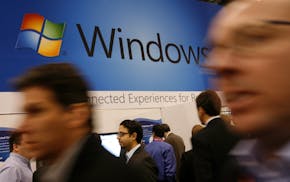Q: I see you're recommending Windows 7 for Windows XP users when Microsoft stops providing security updates for XP in April. Are you aware that Microsoft's mainstream support for Windows 7 ends next January? Extended support will go to 2020.
Although Windows 8 and 8.1 are radically different, they have an additional three years of mainstream and extended support.
Windows 8.1 allows you to return to the desktop screen we're all used to.
I think that sooner or later many will want to use the touch-screen interface on Windows 8 with their smartphones and tablet computers.
Dave Dworkin, Minneapolis
A: Familiarity with Windows 8 is not a skill that will transfer to most smartphone or tablet computers today, because nearly all of them use the Google Android or Apple iOS operating systems. Microsoft's market share in smartphones is 3.9 percent today, although growing (see tinyurl.com/mdxkvd9).
Windows 8.1 does not return the user to the full Windows 7 interface. If it did, there would be far fewer complaints. People are voting with their dollars: Windows 8 and 8.1 are used by 10.6 percent of PCs, while Windows 7 is used by 47.5 percent.
Windows 7 users will be well-served by Microsoft's extended support that includes security updates through 2020. The passing of mainstream support doesn't really matter.
I think people using Windows XP are already facing enough change with the leap ahead to newer, more full-featured versions of Windows. They shouldn't have to learn the radically different Windows 8 and 8.1 as well, particularly when that user interface may soon change. There are rumors that Microsoft's pending Windows 8.1 update may look and act more like traditional Windows (see tinyurl.com/posggkb). We'll have to wait and see.
Q: I read your column about credit card security, and I don't understand why users don't have a fingerprint option. I understand it wouldn't solve all identity theft, but I believe it would take a big chunk out of it.
I have seen fingerprint devices in banks, so the technology is available. While I can see why some people don't want their fingerprints on file, I think a lot of us would like the assurance that only our fingers could do the buying.
Ray Omdahl, Green Valley, Ariz.
A: Using fingerprint identification for financial transactions sounds good until you think about the ramifications. If somebody steals your credit card number, you can cancel the account. But if somebody steals your fingerprint, then that form of ID will have been compromised forever, and any accounts you have that use that fingerprint will be vulnerable.
You could, of course, change all your accounts to use a print from a different finger, then hope that fingerprint will never be stolen.
E-mail tech questions to steve.j.alexander@gmail.com or write to Tech Q&A, 425 Portland Av. S., Minneapolis, MN 55488. Include name, city and phone number.

Alexander: A beeping computer is telling you what's gone wrong inside

Alexander: How to stop deleted iPhone e-mails from coming back

Alexander: Refurbished PCs may need a BIOS update to use new components

Alexander: Windows 11 not always to blame for browser or e-mail problems


